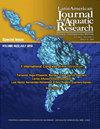南美洲海洋哺乳动物研究:30年的出版努力和合作网络
IF 0.8
4区 农林科学
Q3 FISHERIES
Latin American Journal of Aquatic Research
Pub Date : 2022-05-01
DOI:10.3856/vol50-issue2-fulltext-2810
引用次数: 1
摘要
栖息在南美洲大西洋和太平洋水域的海洋哺乳动物种类繁多。几十年来,南美洲国家一直在对这些物种进行科学研究。然而,对于这项研究的重点和主要主题,仍然没有系统的评估。这项研究分析了南美洲海洋哺乳动物科学研究的趋势和模式,评估了一系列文献计量指标,并绘制了国家、作者和研究领域之间的合作关系。学术文献检索自两个书目数据库:SCOPUS和SciELO,从1990年到2020年。结果显示,在这三十年的研究中,发表的文章逐渐增多。巴西在这两个数据库的出版物数量中都发挥了核心作用,其次是阿根廷和智利。南美洲关于海洋哺乳动物的出版物集中在少数期刊上,很少有作者对大部分贡献负责。作者表现出适度的合作水平,主要反映了邻国之间更紧密的联系,包括与北美和欧洲国家的合作。最常见的关键词反映了以分类群为中心的三个聚类(鲸目、齿蜡目和Pinnipedia)和以研究主题为中心的两个聚类(污染和系统发育学)。捐款的范围因藏品而异。尽管如此,这两个数据库是互补的,有助于展示南美洲的海洋哺乳动物研究。本文章由计算机程序翻译,如有差异,请以英文原文为准。
Marine mammal research in South America: 30 years of publication efforts and collaborative networks
A notable diversity of marine mammals inhabits the Atlantic and Pacific waters of South America. For decades, South American countries have been producing scientific research focused on these species. However, still, there is no systematic assessment of the magnitude and main subjects on which this research has been focused. This study analyzes the trends and patterns in scientific research on marine mammals in South America, evaluating a pool of bibliometric indicators and mapping collaborative relationships among countries, authors, and research areas. Academic documents were retrieved from two bibliographic databases: SCOPUS and SciELO, from 1990 to 2020. Results showed a gradual increase in publications along the three study decades. Brazil played a central role in the number of publications in both databases, followed by Argentina and Chile. The South American publications on marine mammals were centralized in a small number of journals, and few authors were responsible for a large proportion of contributions. The authors showed a moderate level of collaboration, mainly reflecting stronger links among neighbor countries, including co-authorships with North American and European countries. The most frequent keywords reflected three clusters centered in taxonomic groups (Cetacea, Odontoceti, and Pinnipedia) and two centered in research subjects (pollution and phylogenetics). The scope of the contributions differed among collections. Nevertheless, both databases were complementary and contributed to show marine mammals' research in South America.
求助全文
通过发布文献求助,成功后即可免费获取论文全文。
去求助
来源期刊

Latin American Journal of Aquatic Research
FISHERIES-MARINE & FRESHWATER BIOLOGY
CiteScore
1.70
自引率
10.00%
发文量
44
审稿时长
4-8 weeks
期刊介绍:
Latin American Journal of Aquatic Research- LAJAR is the continuation of the journal Investigaciones Marinas (1970-2007) and is published since 2008 by the Escuela de Ciencias del Mar, Facultad de Ciencias del Mar y Geografía of the Pontificia Universidad Católica de Valparaíso. LAJAR is an “Open Access” journal that publishes in English language, original research articles, reviews and short communications on aquatic science, which contain the results of research conducted in aquaculture or in oceanic and coastal marine waters of Latin America.
The following topics are considered: Physical Oceanography, Chemical Oceanography, Marine Biogeochemistry, Marine Pollution and Toxicology, Marine Geology and Geophysics, Biological Oceanography, Fisheries and Aquaculture.
 求助内容:
求助内容: 应助结果提醒方式:
应助结果提醒方式:


